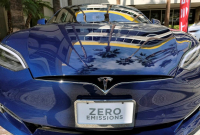Support strong Canadian climate journalism for 2025
Climate change is disruptive. We can all agree on that. But there is a path forward where we can rise above the disruptions: electrification. It’s the best way to bridge the gap to meet our greenhouse gas (GHG) reduction goals.
The B.C. government has committed to a 40 per cent reduction in GHG emissions by 2030 (based upon 2007 levels) – something that benefits us all. This sets a clear goal for what success looks like for B.C. It’s an ambitious target but it demonstrates a government that understands that the opportunities for B.C.’s economy, resilience, innovation and employment are tremendous. Alternatively, failure to mitigate against climate change would cost our economy far more than any industry can generate.
B.C.’s brand is “supernatural” and associated with a clean, green environment. Our electricity is among the greenest in the world and at one of the lowest costs anywhere. This has blessed B.C. with one of the biggest tools available in the carbon reduction box. Using B.C. clean energy, with our abundance of existing hydro dams, run of river hydro, wind, solar and biomass (not to mention the immense potential for geothermal, batteries, and wave & tidal power) gives us a phenomenal competitive advantage by helping us create some of the lowest carbon products and services in the international marketplace. Dramatically cheaper renewable energy technologies are already competitive and this trend is only going to continue.
“The future is a foreign country and it’s our largest trading partner” – Vinay Gupta
Working in partnership with First Nations and local communities, the expansion of our electricity generation systems throughout the province builds resilience, reconciliation and local economic empowerment. We’re already producing the lowest carbon aluminum and every cup of coffee made in B.C. with our clean electricity is ultra-low carbon.
As B.C. designs our climate change strategy and the energy roadmap comes together, electrification will be a central part of it. Simply put, this means using much more electricity instead of other energy sources. It reduces our exposure to the risks associated with climate change, both environmental and economic. It continues the process of diversifying our economy and helps to insulate us from the volatility and disruption that is already becoming increasingly common. It enables us to capitalize on the vast resources that are being focused on climate solutions and it sends the signals to the investors, manufacturers, suppliers and the educators from the clean technology sector. And it creates the fertile environment that opens the door for investment on innovation to be applied in an environment where the clear goals are laid out for the future of a low carbon B.C.
But how do we take advantage of this pathway? In order to meet our GHG targets through electrification there is a need to significantly increase the amount of renewable energy being generated in B.C. by more than 5 GW of peak power. This is equivalent to adding more than 25 per cent of additional power generation to B.C. by 2030! In addition to BC Hydro heritage assets, BC already has over 120 small hydro, wind, solar, biogas and biomass projects that are providing clean, low-cost electricity to British Columbians in partnership with First Nations. These clean energy companies are at the forefront of the fight against climate change and have the expertise needed to lead the electrification transition.

Fossil fuels and their place in this transition.
And what about fossil fuels? Let’s use them for the highest and best applications. Suppliers can then shift the focus to exporting the lowest GHG fossil fuels to the rest of the world, an attractive product.
Electrification can reduce GHGs in one of our most important resource sectors: natural gas. B.C. is in an enviable position when it comes to natural gas and LNG. We have remarkable reserves, and because of our clean electricity grid, we have an almost unique capacity to electrify the processing of our natural gas, LNG and distribution. With full electrification, B.C. natural gas and LNG products would be amongst the lowest life cycle carbon emission fossil fuels in the world.
By 2050 the world will have transitioned towards an 80 per cent carbon reduction. Therefore in the medium term (20-40 years) carbon-constrained future, it is only the highest quality, lowest GHG fossil fuels that will still have a share of the market. For those that want to see the natural gas industry not only survive but to thrive, clean energy is the solution in this transformational time. It gives investors the confidence to keep their money in the sector and it gives B.C. the capability to add value and securing the jobs and economic benefits that are so vital. Natural gas and LNG’s future is inextricably linked to clean energy.
Where are we now and how can electrification help?
Electrification is the biggest tool in the toolbox when it comes to bridging that gap and meeting that need. Clean technology is the fastest growing sector in the world and it sits at the core of the electrification process.
In 2007 B.C.’s total carbon (equivalent) emissions were 64.66 million Tonnes (Mt).
Our 2030 target is 38.8 million Tonnes, which is a 40 per cent reduction. Currently our emissions are 61.6 million Tonnes – we need to find another 22.8 million Tonnes (37 per cent) of reduction over the next 12 years.
Total reduction = 22.97 Mt which equates to a 40 per cent reduction from 2007 levels.
We can do this by reducing GHGs by 39 per cent in transportation: electric vehicles, hybrids, plug in hybrids, bio-fuels, hydrogen internal combustion, fuel cells, renewable fuels etc.
We can improve our built environment, for another 17 per cent reduction: electrification of heating such as air source heat pumps reduce the emissions by 97 per cent over gas and a geoexchange system reduces emissions by 99 per cent.
And industry has a big role, where we can reduce emissions by 41 per cent. This is already starting to happen. Electrifying the natural gas industry reduces GHGs by over 90 per cent! And the Mining Association of BC is committed to taking advantage of our electricity resource by moving forward on delivering the lowest carbon minerals in the world.
So, remember, the path may be challenging but it is there for us to either follow, or for us to lead. Electrification is our way to a decarbonized future, which is why Clean Energy BC is hosting our first ever Global Electrification Now = Low Carbon Future Summit in Vancouver on June 14th, 2018. To take part in this transition visit Clean Energy BC for more information about the Summit.
Jae Mather is the Executive Director of Clean Energy BC






Comments
OMG. Of course we now need site C power to make the processing of natural gas in Prince Rupert for export. It all fell into place , for me, when Mr Horgan recently raised the hope of attracting Asian investors to invest in a “ clean “gas export facility. Wasn’t this the Liberal government plan all along ? So nothings changed with the new government. We’re still trying to put lipstick on a pig ( my apologies to the pigs ) . Sorry, this is not green and can never be green when you burn fossil fuels.
I had trouble determining the writer’s intentions when I read this. Much of it does not make sense. What we do in B.C. will have a negligible impact on us. Any impact will be on the choice of actions the rest of the world take if we set a good example. It is only if everyone acts together that global warming can be brought to heel.
Almost all the energy we use ends up heating the environment, i.e. it is wasted. This is what we should be spending our time addressing. It is also cheaper than increasing the electricity supply. This is why efficient refrigerators are good (although if they only last ten years compared to 30 years for the old inefficient ones there may not be a benefit); but they should have a mandated guarantee of 30 years.
Mather does not even mention the fact that we should not be constructing any more fossil-fuel infrastructure, and should be deconstructing the existing infrastructure as it becomes obsolete.
There are good reasons combustion engines came to dominate applications requiring torque and power: no other motor comes close. Consequently it will take A LOT more electrical power to replace our current use of gas and diesel.
More concerning are Mr. Mather's comments on natural gas. He does not seem to recognize that the crux of mitigating climate change is to keep the carbon in the ground, not to skim some profit by exporting it (to be burned) by those poor benighted peoples who don't have the good fortune to live in BC.
Most concerning is his rosy talk of economics. The current economic paradigm is a big driver of why we are in this mess. Therefore economics needs to change (massively) to get back to serving humanity (yes there are PhDs working on this now), and what current economics says about climate mitigation is largely irrelevant (read Naomi Klein's "This Changes Everything").
Maybe I missed this in the article, but how is the electricity generated?
If it's nuclear, or fossil fuel, sourced, we're no further ahead, right?